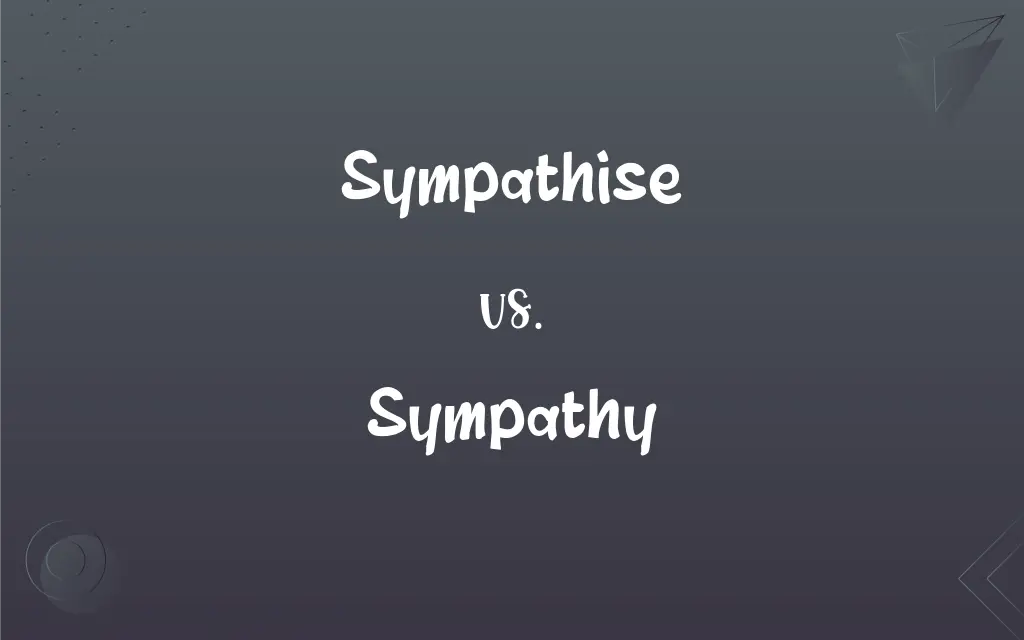Sympathise vs. Sympathy: What's the Difference?

Sympathise and Sympathy Definitions
Sympathise
Standard spelling of sympathize
Sympathy
A feeling of pity or sorrow for the distress of another; commiseration.
Sympathise
Share the feelings of; understand the sentiments of
Sympathy
Often sympathies An expression of such feeling
Offered her sympathies to the mourning family.
Sympathise
To feel or express sympathy or compassion
ADVERTISEMENT
Sympathy
Mutual understanding or feeling between people
"Like two frightened children, we sought at the same time to comfort one another, so quick was the sympathy between us" (Nicholas Meyer).
Sympathise
Be understanding of;
You don't need to explain--I understand!
Sympathy
Agreement with or support for an opinion or position
The mayor is in sympathy with the proposal.
Sympathy
Often sympathies A tendency to support a position or opinion
A politician of conservative sympathies.
Sympathy
A relationship or affinity between things in which whatever affects one correspondingly affects the other
"Continuous measurements of ionospheric densities ... showed a variation of noon ionization in sympathy with sunspot activity" (E.V. Appelton).
ADVERTISEMENT
Sympathy
(Physics) A relation between bodies such that vibrations in one body cause sympathetic vibrations in another.
Sympathy
(Physiology) A relation between parts or organs by which a disease or disorder in one induces an effect in the other.
Sympathy
A feeling of pity or sorrow for the suffering or distress of another.
Sympathy
(in plural) The formal expression of pity or sorrow for someone else's misfortune.
Sympathy
The ability to share the feelings of another.
Sympathy
Inclination to think or feel alike; emotional or intellectual accord; common feeling.
Sympathy
(in plural) Support in the form of shared feelings or opinions.
Sympathy
Feeling of loyalty; tendency towards, agreement with or approval of an opinion or aim; a favorable attitude.
Many people in Hollywood were blacklisted merely because they were suspected of Communist sympathies.
Sympathy
An affinity, association or mutual relationship between people or things such that they are correspondingly affected by any condition.
Sympathy
Mutual or parallel susceptibility or a condition brought about by it.
Sympathy
(art) Artistic harmony, as of shape or colour in a painting.
Sympathy
Feeling corresponding to that which another feels; the quality of being affected by the affection of another, with feelings correspondent in kind, if not in degree; fellow-feeling.
They saw, but other sight instead - a crowdOf ugly serpents! Horror on them fell,And horrid sympathy.
Sympathy
An agreement of affections or inclinations, or a conformity of natural temperament, which causes persons to be pleased, or in accord, with one another; as, there is perfect sympathy between them.
Sympathy
Kindness of feeling toward one who suffers; pity; commiseration; compassion.
I value myself upon sympathy, I hate and despise myself for envy.
Sympathy
The reciprocal influence exercised by organs or parts on one another, as shown in the effects of a diseased condition of one part on another part or organ, as in the vomiting produced by a tumor of the brain.
Sympathy
A tendency of inanimate things to unite, or to act on each other; as, the sympathy between the loadstone and iron.
Sympathy
Similarity of function, use office, or the like.
The adverb has most sympathy with the verb.
Fault,Acknowledged and deplored, in Adam wroughtCommiseration.
Sympathy
An inclination to support or be loyal to or to agree with an opinion;
His sympathies were always with the underdog
I knew I could count on his understanding
Sympathy
Sharing the feelings of others (especially feelings of sorrow or anguish)
Sympathy
A relation of affinity or harmony between people; whatever affects one correspondingly affects the other;
The two of them were in close sympathy







































































